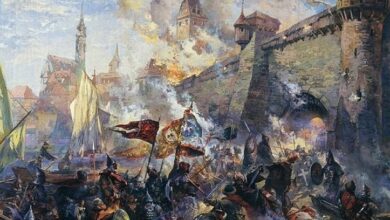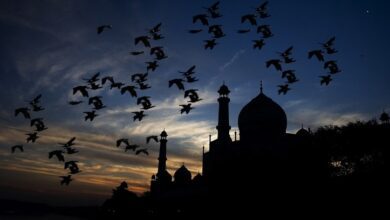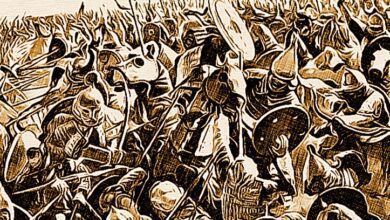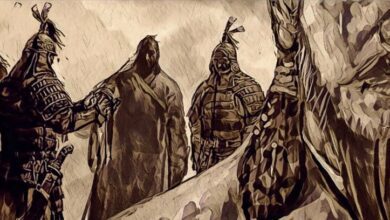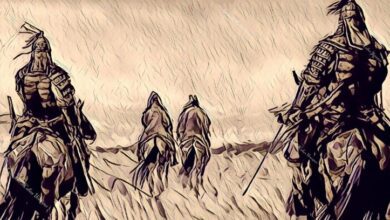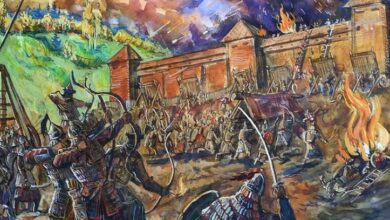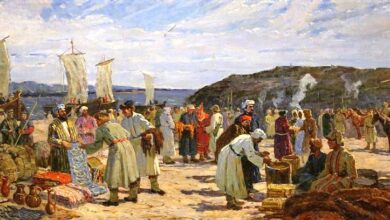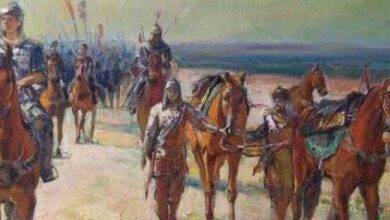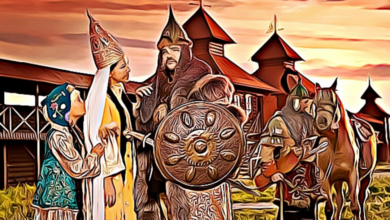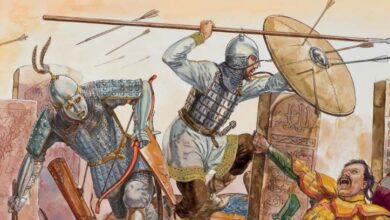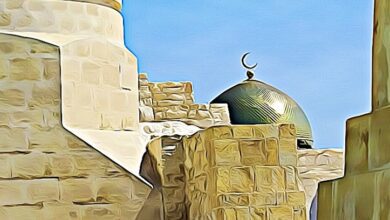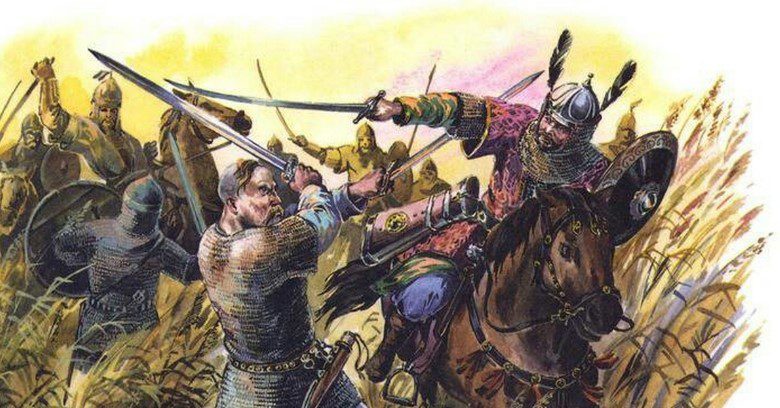
Ghazi Baraj Tarihi. Chapter 4
Xthe Azars retreated a little, and when Bat-Boyan approached them again, the new khakan Kaban - the nephew of the old one - offered him peace on the following terms: the Khazars retain the Kara-Bulgar and Bulyar parts of Saklan for the Bat-Boyan dynasty, and Burdzhan for the Khumyk clan, in response to which the Baltavars renounce the titles of khakan and kan, cede the Saklan steppes between the Lower Shir and Dzhaik to the Turks and give part of their soldiers for external wars to the Khazars or a ransom tribute for non-participation in them. Khumyk agreed and drove off to his Burdzhan, while Bat-Boyan decided to think and concluded only a truce with the Khazars. However, on the way back, he learned that in his absence, Shambat and Atilkese occupied his Dzhalda and were moving towards him. Hakan went into a frenzy, uncharacteristic for him. Intoxicated by this feeling, he went to the Boar and made peace with him. When the letters were sealed, the Khazar khakan hugged Bat-Boyan and said with emotion: “We have one God - Tangra, one clan and one Turkic language ... Therefore, I consider you my relative and brother. In addition, I feel like your debtor, because your people finished off the hated Kalga. Therefore, I will help you become a master in your own domain.”
Together they go to Kara-Bulgar. When they were at the village of Kharka, Shambat and Atilkese left Dzhalda for fear of being locked up there and rushed to the allies. When they got closer, Bat-Boyan invited them to submit to him without a fight. They just laughed and recklessly galloped into battle ... The boar did not allow the Baltavar to join the battle. Throwing the Turkmens towards the rebels, he with the Kyrgyz went around the place of their collision, hit them in the rear and achieved victory. Shambat and Atilkese again took refuge in Bashtu. The boar tried to take the city on the move, but the Bulgars of Shambat, under the banner of the Kharkiv clan, made a sortie and turned the Khazars into a stampede. Then the khakan retired to Djurash and said to the Baltavar: "Now arrange your affairs yourself - I helped you as much as I could."
22
Bat-Boyan entered into negotiations with the besieged and agreed with them on the division of the Kara-Bulgar. The right-bank part of the bekship remained under the rule of Shambat and Atilkese, and the left-bank part went to the Baltavar ... Peace-loving Bat-Boyan did not attempt to drive the rebels out of Bashtu by force, for he correctly believed that if Tangra wished, he would achieve this without a single shot. Indeed, Shambat died two years later, and Atilkese, not feeling sufficient support from the Saklans and Anchians, preferred to leave with part of the Burdjans and Turkmens for Kashan. And this is an extremely fortified region, surrounded on three sides by the Burat, Sula and Audan-su rivers, and on the fourth side by the Ulag mountains ... Atilkese spent here - as a bek of his Bulgars, local Ulchis and Ulags - several years in complete safety. Only hostile actions against him by the Avars and the Rums allied with them forced him to leave this region and go to the Iskander mountains. There he formed his kingdom, which he called Burdzhan - in memory of his former possession. His descendants, as seid Yakub wrote, adopted Christianity from the local Ulchis, and with it the Ulchi language. And this happened due to the fact that the priests of the Ulchians preached in their own language and that the Bulgars settled in the houses of the Ulchians. Only the Burdzhan Kuk-Oghuz, who did not abandon their lives in the field, retained their Turkmen language...
The departure of the Burdjans made Bat-Boyan the sovereign Baltavar of the entire Kara-Bulgar, whose capital was Bashtu...
Bat-Boyan died in 690 at the age of 65, having lived five years longer than his father. He was succeeded by his son Bat-Timer or Bu-Timer, nicknamed Djurash. Menla Abdallah says: “Khakan Kaban loved Bat-Boyan so much that he invited him and his grandson Bu-Yurgan Khumyk to be present when the rope was tightened around his neck during the ritual of asking Tangra about the time and nature of his reign. When news came from Bashtu about the death of Bat-Boyan, the Boar immediately wilted and soon died of frustration. The evil son of Kalga Aibat came to power. His wife was a Bukhara yahudka, but she was a real monster, and therefore he decided to marry the beautiful daughter of the Kashek bek ... Bek, familiar with the Bulgar customs, suggested that the khakan compete with him for his daughter. The vicious but cowardly Aibat was frightened and begged Bu-Timer to fight the bek of the Kasheks for him. Baltavar won in single combat with the bogatyr-bek, but after that his daughter suddenly declared: “I will marry a true winner.” Then Aibat ordered to bring her to him by force. However, when the Khakan's servants came for her, she committed suicide...
Aibat then called Bu-Timer to him and told him: “The bride you won for me died. If you are a man of honor, then bring me the Gurdji princess. Baltavar, for whom honor was dearer than life, involuntarily went to Gurja. With the help of the local Khons, who lived in the special principality of Khondzhak, he managed to defeat the Gurji bek and capture his daughter. But on the way back, the Bek's son Dzhukhman attacked the Bulgars from an ambush, trying to recapture his sister. He managed to break through to Biki's wagon and drag her along with him. Ours, however, succeeded in killing the Gurdjians and overtaking the fugitives. Then Jukhman drew his saber and hacked his sister to death so that she would avoid the shame of captivity. Bu-Timer captured him and brought him to the khakan with the words: "I did everything to fulfill my promise, but her brother prevented me." Aibat flew into a rage and, placing the blame for the death of the princess on the Baltavar, ordered his servants to kill the Baltavar right in his tent. In reality, the khakan killed Bu-Timer in the hope of capturing the booty he had taken in Gurja and suddenly taking possession of the Kara-Bulgar. After this atrocity, a crowd of Turks attacked the Kara-Bulgars, but ours were on the alert and in response turned the Khakan headquarters upside down. At the same time, the son of the Boar Kuk-Kuyan was released from the zindan, who immediately proclaimed himself a khakan and killed his uncle. The son of Bu-Timer Sulabi, who led the Kara-Bulgars, was honored to be present at the tightening of the rope around the neck of the new Khakan and informed everyone about the permission of Tangra for his 45-year reign. And Dzhukhman, in this turmoil, fled to the Saklans, and from them he made his way to Gurja ...
Sulabi, unlike his father, did not like wars and tried his best to avoid them. On the other hand, the Baltavar was willingly engaged in trade affairs and made busy the land and water roads leading to Avaria, Artan, Rum, Dzhalda, Seber and Kashek. He separated the best part of the Ulchians from the rest of the Igenches and, ordering them to bear the duty of making ships, called them subashes. He also set up 10 districts of djien and himself willingly traveled around them, choosing them as tarkhans of boyars and collecting tribute in furs and products. However, when Kuk-Kuyan informed him that the Gurji bek began to oppress Khondzhak in retaliation for the help of the Khons to their brothers, the Baltavar went on a campaign. Ours easily defeated the Gurjians, who were unstable in battle, and again captured Dzhukhman. But his gray-bearded father suddenly appeared in the Bulgar camp and offered Sulabi to take him prisoner in exchange for the freedom of his son. Struck by such strong parental love, Sulabi not only granted freedom to both father and son, but also fraternized with Jukhman and took his name. The delighted Gurji Bey promised not to oppress Khondzhak and pay tribute to the Khakan, and Sulabi set off home with a light heart...
24
Kuk-Kuyan was incredibly pleased with the success of the Baltavar and became extraordinarily proud. Intoxicated with glory, generally mild-mannered, the khakan even dared to raise his sword against the warriors of the Islamic sultan. But by the will of the Almighty, punishing for excessive pride, he was utterly defeated in 737. Having come to his senses, Kuk-Kuyan decided to make amends and announced to the ghazis that he wanted reconciliation with the Sultan and therefore allowed his subjects to accept the true faith. Then part of the Burdjans converted to Islam, so that the soldiers of the Sultan would not ruin them during their campaigns against the Khazars, but the Kara-Bulgars abstained because of the accidental plunder of their trade caravan by the Gazis...
Sulabi ruled for 27 years and died in 727, leaving power to his son Avar from Avar. Under him, the Anchians became the backbone of the Bulgarian power in Kara-Bulgar, which was also called Kara-Saklan - in contrast to the Khazar Ak-Saklan. And the Anchians, as I have already noted, are a mixture of part of the Ulchians with some clans of the Uruses and Bulgars, from whom they inherited courage. And from our Bulgars, the Anchians included many of the clans of Erdim, Seber, Bakil, Agachir, Baryn and others, who later headed the Anchian clans ... The Anchians were freed from all duties, except military, and those taken from them for service were not even allowed to marry in the time of carrying it.
However, the Anchians gladly carried out this duty, for they were warlike and received vast lands in the Bashtu district and a good salary for it. The Anchians were in hostile relations with the Uruses, since those Uruses who were expelled by their tribe fled to the Anchians. Our people called the Saklans-Uruses Balyns, as the Anchians called them, and then they began to call all the northern Ulchians who lived in forests and swamps ... The language of the Anchians differed from the language of the Ulchians-Balyns, but still they understood each other ...
In addition to several thousand Anchians, Avar had a thousand Djurashians in the service, not counting those Djurashians who worked in the Baltavar forges and made excellent weapons and armor. And all of them, as a sign of love for their ruler, called themselves Avars.
Avar, at the request of his mother, made several trips to the farangs in support of the Avars and helped this tribe improve their affairs. And the Baltavars made these campaigns through the Uchuly mountains, which were once called Shambat in memory of their three sons. They were left by him with their mothers in Dulob when he was forced to retreat from there back to Bashta ...
In 745, Avar had a chance to use weapons inside his own country against the rebellious Balyns. The uprising was raised by the Uruses, dissatisfied with the rise of the Anchians and the size of the Baltavar taxes. The Balyns immediately supported this rebellion, encouraged by the arrival of the Ulchians from the island of Artan. These Ulchians were expelled by the Galidjians, but in order to be feared, they called themselves Galidjians. They built the Galidj fortress on a large lake and led a rebellion ... Avar defeated the Uruses. One half of them chose to submit to the Baltavar, but the other half preferred to flee. Some fugitives went to Galidj, but most of them moved to the Shire, where they were called Burtases. At that time, Kuk-Kuyan had just died, and the son of Aibat and the adopted son of Kuk-Kuyan, Bardzhil, became the Khazar khakan. The new khakan was very happy about the turmoil in the Kara-Bulgar and not only did not return the fugitives, but also built the city of Urus for them. In the same way, the Galidjians welcomed the Uruses cordially and built another city, Urus, for them on their lake. The enraged Avar sent his eldest son Tat-Utyak to the north, and he destroyed Galidj and Urus to the ground. The frightened rebels fled even further north, but after some time they returned and resumed their settlements ...
Simultaneously with the return of Tat-Utyak, a large number of Sabars or Sabans arrived in Kara-Bulgar, whose beks were involved in an attempt to overthrow Bardzhil. It turns out that he refused to sit on the throne according to custom for fear of being strangled and announced his acceptance of the faith of the Yahuds. He was supported by the Murdases, Burtases, Cumans, Djurash, Saklans and Kuk-Oguz, but the Kyrgyz-Sabans opposed and were expelled. Khakan demanded that Avar extradite the fugitives, but now Avar took pleasure in refusing him. Annoyed Bardzhil then ordered the Muslim Burdjans to abandon the true faith and accept ... Judaism, although he himself did not really adhere to this false faith of the errant. The Burdjans refused and were crushed by the vengeful khakan. Those of them who resisted were forced to flee to Bulyar...
The Murdases met the refugees with hostility and tried to hand them over to Bardjil. Then the Burdjans complained to Avar, and he sent his youngest son Tat-Ugek to help them. He defeated the Murdases and forced them to flee to the upper reaches of the Aka~Idel. Here they mingled with the Ulchis so that a new Ulchi tribe, the Murdas, was formed...
25
The Burdjans and the Sabans who came with Tat-Ugek calmly settled on the free lands. The Burdjans built a city for themselves, which they named after their leader Marduan. The Khazars remade this name into 'Mardukan'... The foundation of the city took place in winter, into 'Nardugan'... In this ceremony, its participants made a snow town and then subjected it to a symbolic storm. If the "defenders" of the town persisted, then the "besiegers" pointed to the top of a large tree and shouted:
Here comes the sun -
Great Tsar Kubar,
Powerful and brilliant
And blinded the enemies!
Khas nardugan,
Khas nardugan -
Be always
Our protector and helper!
Then the "defenders" covered their faces with their hands and prostrated themselves, and the "besiegers" occupied the "town" and hung the effigy of the "enemy king" on top of a tree...
And this custom was purely Burdjanian, and only the inhabitants of the city of Marduan, later called Bolgar, celebrated it. And the custom to call Tangra Kubar or Suvar was purely Burdjanian… Later Ahmed ibn Fadlan… did not tolerate this ceremony and forced to move its celebration away from the city in the hope that this would complicate its organization and force it to move away from it. But the Bulgarians fanatically traveled for many snowy miles and in any cold to celebrate Nardugan, showing an example of the Bulgars' devotion to their customs...
The Sabans settled east of Marduan and his small bekdom and at first obeyed him. They came with their wives and children, and therefore their language did not disappear, but was established. Local Utigs mixed with some of them and passed on agricultural skills to her. When the Kara-Bulgars came, they called the Saban plow Saban, but meanwhile, it was Utig in origin...
In 759, however, Marduan's peaceful life was disrupted. Bardzhil, burning with a thirst for vengeance, set the Bashkorts on the Bulyar Burdjans, and they crossed the Dzhaik. The Sabans took up arms, and old Mar sent envoys to Avar asking for help. Avar again sent Tat-Ugek to Marduan and soon after his departure he died, transferring power to Tat-Utyak ... Tat-Ugek went to meet the Bashkorts and defeated them due to the fact that the warriors of the strong Bashkort tribe of Esegs, called by our Azna, Atnya or Aznak, switched to his side. The son of Bardzhil Bulan took advantage of this defeat of the Bashkorts to declare his father weak and subsequently overthrow him. Having seized power, Bulan ordered his father to be strangled with a rope. Abdallah ibn Bashtu says that when the killers approached Barjil, he said: “I was afraid of the rope and because of this fear I succumbed to the temptation to change the faith of the Almighty. And now, for this, by the will of Tangra, I am dying from the same rope - it serves me right! I should have realized that it was better to be lifted by Tangra to the throne with a rope than to be strangled by her on the throne!” […]
Esegy also proclaimed Tat-Ugek their bek, and he formed the Esegel bekship between the Sak and Sok rivers. Following this, in 760, Tat-Ugek subjugated Marduan and renamed it Bolgar. The Sabans-farmers submitted to him, but the Sabans-pastoralists went to the upper reaches of the Agidel and, in protest against the power of the Bek, called themselves Burdzhans. The Esegs, like the Kara-Bulgars of Tat-Ugek, took Sabans as their wives and also very soon began to speak the Turanian and Kypchak dialects of the Sabans, as in their own languages ... And the Esegs called the beylik of Tat-Ugek “Belermey”, since he was the territory of the former Bulyar, and the Kyrgyz Turks remade this name into "Besermen" and from that time on they sometimes called the Bulgars "Besermen". This nickname of the Bulgars was later adopted by the Cumans, the Uruses, and the Tatars...
In 787, at the instigation of Bulan, the Bashkorts again attacked Besermen because of Dzhaik. Bek at first went out to meet the enemy and began to fight with him. But then came the news of the death of Tat-Utyak, who bore the nickname Sarachin, and Tat-Ugek Besermen preferred to go to Bashta to occupy the Kara-Bulgarian throne. During the crossing of the Idel, his raft was pulled under water in a whirlpool near the Mountain Coast, and the bek drowned ...
In 765 Tat-Utyak's daughter from the Urusky was married off to the grandson of Kuk-Kuyan, the son of Shadchin or Saksin Asankul. She gave birth to her husband's son Urus, who enjoyed great love of the Khazar Saklans, Kasheks and Burdjans. Abdallah ibn Mikail testifies that her fate was tragic...
28
Bulan, intoxicated with luck, attributed it to… the Yahud faith and began to zealously introduce it among his Turks. The Kuman and some Turkmen beks accepted this false belief, and from that time on, only the Jewish Turks began to be called “true” or “white Khazars”, and the Khazar pagan Turks were called “black Khazars”. The clan of Urus, the father of Khakan Kaban, also belonged to the black Khazars, but in 805 Bulan's dirty hands reached out to him. Asankul flatly refused... to accept Judaism even for appearances and was brutally murdered along with his father and wife by the distraught khakan. Execution also threatened Urus, but he managed to gallop away to the Bulgar bekdom of Dima-Tarkhan, which was ruled by the son of Tat-Ugek Tamyan under the auspices of Rum. And here there were many Bulgars who fled from Khondzhak on the Karachay River and another Bulgarian bekdom in Gurja - Buda on the Chupsu River. And at the mouth of this river, Emir Lachyn Hisami later landed with an army and almost drowned, because his boat capsized ... Since there were more Bulgars from Karachay, all the Bulgars of Dima-Tarkhan were called Karachays. Under their rule was a part of the river Kuba, which was also called Kuba-Bulgarsu, but after the Kasheks were indignant at the murder of Asankul and joined Dima-Tarkhan, the whole of Kuba was within the borders. And the Karachays joked that Tangra did not allow them to leave the banks of this river. After all, the Bulgars came here even before the invasion of the Khons, and then, having mixed with them, part of them went to Khondzhak to serve the Persian fallens. And now they returned to their original place, which is considered one of the most blessed in Saklan ...
The aged Bulan, forgetting about his advanced age, went on a campaign against the Kasheks and Urus. This was instigated by his son Ben-Amin, who planned to end his father during the campaign ... When Bulan drove up to the high coast of Cuba, a servant bribed by Ben-Amin pushed him unnoticed by everyone, and the khakan fell off his horse and crashed. This did not upset anyone - according to the Khazars, forty-five years of rule was enough. ... the Yahud priests immediately, in the field, muttered a few words, and Ben-Amin became the new khakan. Having settled comfortably in the Khazar capital, which the Bulgars in irritation called Etil, that is, the "Dog City", because the white Khazars were often called dogs, he, with the help of his Yahud djurs, began to spread everywhere ... "Yahud faith and repair attacks on Dima-Tarkhan. When the Yahud Turks began to cut the sacred trees of the pagans and destroy the mosques of the Burjans, the black Khazars, Saklans, Djurashians and Burjans took up arms...
The son of Sarachin Kan-Karajar, who ruled in Kara-Bulgar, was completely indifferent to this uprising because of strained relations with Tamyan. But Urus and Tamyan actively helped the rebels, whose cry was the name of Kubar. Therefore, this war was called Kubar or Suvar. In the midst of this uprising, the Bashkort ambassadors came to Ben-Amin and told him: “We were attacked by the Badjanaks, expelled from the Semirechye by the Turkmens of Khorasan, and mercilessly burn our villages. We have always helped the Khazars – now you help us.” Ben-Amin recklessly refused to help them, although the rebels could not threaten Itil in any way, and the Bashkorts were utterly defeated by the Saban-Bajanaks.
One part of the Bashkorts fled to the Oghuz and Kipchaks, the other to the right tributary of the Shir Sasy-Idel, the third to the Baigul River. But the places here were hungry, so half of the Bashkorts very soon crossed the Urals to Chulman-Idel and Agidel and formed the Bershud bekdom here ...
The Bashkorts who remained on Baigul called their region Seber, and themselves - Baiguls and Ishtyaks, who went to Bershud - Sebers, and those who went to Sasy-Idel - Modjars. The Modjars quickly extended their power to the Murdas and Sur Ars and, having strengthened, began to take out their irritation on the treacherous Khazars. When one of their detachments reached the environs of Itil, Ben-Amin's younger brother Karak angrily said to the juras around him: “Ben-Amin is clearly not the chosen one of the Yahud gods, for they have deprived us of their support. We must raise another to the throne." The words of the prince, as Abdallah ibn Bashtu testifies, made the white Khazars think and rally around Karak. Abandoned by everyone and surrounded only by enemies, Ben-Amin was quietly strangled near the town of Bel-Imen, and his Yahud priests were buried alive in his grave.
Wasting no time and scorning pride, the new Khazar Khakan Karak turned to Kan-Karajar with a request for help against the Modjars. Since the Modjars had already managed to smash the favorite field headquarters (batavyl) of the Baltavar - Khorysdan and made the road to Dzhalda unsafe, Kan-Karajar willingly agreed. His army, consisting of Kara-Bulgars and Anchians, destroyed the Modzhar possessions on the right tributary of the Shira Misha - north of Sasa-Idel - and reached Sain-Idel. Here the Baltavar defeated the villages of the Murdases and built the city of Kan for a thorough reprisal against the enemies.
Part of the frightened Modjars fled after Sain-Idel and settled between this river and the Sura, and some, together with the son of the Modjar leader Yulai-Bat Askal, even reached Bershud and named one of its rivers Misha ... However, the khakan did not help the Baltavar with the promised strike against the Modjars from the south , and the Bashkorts and Murdases, who came to their senses, besieged the Kara-Bulgarians in their city. Very soon, Kan-Karajar got tired of being under siege and decided to break through to the Kara-Bulgar at any cost. But as soon as he began a sortie, thoughtlessly, without fastening his helmet, an enemy arrow pierced his throat and cut off his earthly life ...
30 Ugyr Aydar, the 15-year-old son of Kan-Karajar and his wife, the aunt of the Burdzhan bek Yomyrchak..., was at that time in Bashtu. Having received the news of the death of his father, he wanted to immediately jump to Caen to take revenge on the enemies. Fortunately, Budim, an Anchi close associate of the Baltavar, restrained him with the words: “Tsar, do not trust the khakan. He deliberately arranges attacks on Murdas to stab you in the back!” However, the Baltavar did not believe the boyar to the end and said to him: “But don’t you want to harm me yourself and quarrel with me with the khakan? So I will send a detachment to Caen and check the truth of your statement! But when the detachment sent was subjected to a perfidious attack by the Khazars, who mistook it for the Baltavar, Aidar was forced to admit that Budim was right and began to act wisely and prudently. As a sign of dissatisfaction with the act of the khakan, Ugyr made peace with the modjars and married the daughter of the Ugyr bek Yulay-Bat... Ugyr's disposition towards the boyar increased even more after he built a new fortress for him, which was named after the deceased kan "Karajar"...
In 816, the Budim detachment, acting on the orders of the Baltavar, captured the Galidzhian region. Baltavar was so pleased with this that he appointed the boyar tarkhan of the conquered Balyn. Budim restored Galidj and Urus, and with the permission of Aidar, who completely trusted him, built Shamlyn, Dzhir and Men. Men was named so because a thousand Balynian Ulchi warriors gathered here to ensure “Budim’s genie trips around his governorship, and he called his Tarkhanate “Ak Urus” - to distinguish it from the Urus region in Kara-Bulgar. The same thousands gathered in Galidzh, Shamlyn and Jira. And these warriors were called "ak uruslar" or "uruslar", because they served the Urus boyar... At the same time, Budim, not trusting the Balyns, hired a thousand Anatysh Almanians and five thousand Baylak Ulchis from the Kulbak tribe. He kept the Kulbakovs by his side, and built the Kalgan fortress on the Kara-Tun River for the Anatysh people. And Aidar encouraged the activities of his boyar in every possible way, for Budim began to send him ten times as much tribute ...
In 817, Karak managed to defeat the Kubarians and break into their capital, the city of Samandar. The leader of the rebels, Mullah Abdallah, was hanged on the minaret of the Jok mosque there by order of the khakan ... And the ancestor of Abdallah, the merchant Sinj, came from India. When the Arab ghazis reached Khorasan, Sinj was here on business and was the first to convert to Islam. Inflamed with the work of enlightenment, he decided to return to his homeland and illuminate it with the rays of the true faith, but the ghazis persuaded him to lead the local merchants, and he remained in Khorasan ... His descendant Abdallah came to Khazaria as part of the Khorasan embassy and was detained here by Khakan Bardzhil. After spending several years in the zindan, Abdallah was released by Bulan and appointed Qadi of the Jurash Burdjans. Soon he built a fortress for himself, which he called Samandar and in which he was executed ...
The defeated Burdjans, Saklans and Djurashes fled to the Modjars and were warmly received by their Bek Yulay-Bat, who was dissatisfied with the Khazars. However, in 820 Karak managed to inflict a severe defeat on the Sasy-Idel Bashkorts, and most of the Ugyrs migrated to the Kichi-Shir region of the Kara-Bulgar. Part of the Kubarians left for the Bulgarian Bekdom of Kara-Bulgar and founded the city of Kubar or Nur-Suvar there, and the other, led by the son of Abdallah Shams, went to the region of Bashtu Kara-Bulgar.
Quite a bit of time passed - and the news came to Bashtu about the impending invasion of Karak on the Kara-Bulgar. Following this, the ambassadors of the khakan came and declared: “You have not paid tribute to Khazaria for five years, and meanwhile the limits and incomes of your state have increased many times over. If you still refuse to pay, the khakan will force you!”
Mulla Shams then appeared to Aidar and told him: “Oh, great Kan! Do not look at this invasion as an ordinary war - after all, the Khakan was able to gather 100 thousand horsemen, and we will not be able to resist him on our own! - "What do we do?" asked the Baltavar. - "You and your people need to convert to Islam - then the Almighty will find a way to save us!" Shams replied. Aidar immediately converted to Islam and sent a double-edged alman sword to the khakan with the words: “I am sending you this sword so that you know: after I have accepted the true faith, Tangra will strike all my enemies with both edges!”
But the djuras of the Baltavar did not dare to immediately part with their delusions. To convince them of the power of the Creator, the mullah told the Baltavar in front of them: “Tonight I saw myself in the balik of Kharkov and heard a voice from the sky: “Let them further strengthen this balik, for the infidels want to go to Basht through this place!”. I think that this is the command of the Almighty and I ask you to fulfill it!” Aidar immediately gave orders, and the balik of Kharka was heavily fortified. As soon as they had time to do this, Karak with his army came to the balik and laid siege to it. Upon learning of this, the djurs of the kan were embarrassed and, in deep thought, moved towards the enemy.
32
There were 20 thousand fighters in the Baltavar army, of which 10 thousand were Anchians, 5 thousand were Kara-Bulgars, 3 thousand were Uruses and 2 thousand were Anatysh and Ak-Urus of Budim. There were no Modjars, since they went on a raid on the Sul Burdjans, who were oppressing the local Avars. The army of the Baltavar approached Kharkov at the moment when the Khazars rushed to storm, and repulsed the enemy onslaught. The annoyed Khazar Turks, however, quickly came to their senses and furiously rushed at the Kara-Bulgars. A battle, terrifying in its fierceness, ensued, in which - and everyone knew this - there could be no prisoners. Despite the courage of the Anchians, 70,000 Turks clad in iron broke through their ranks and overturned the Uruses and 2,000 Kara-Bulgars who were with them with a side blow. When the Khazar Turks, drunk with blood, began to trample on the fleeing Kara-Bulgarians, the Baltavars and the djuras of his detachment cried out: “Oh, mentor! What are we to do now? - "Shout "Allah Akbar" - and boldly rush into battle!" Shams answered. The Djurs shouted "Allah Akbar!" so that the earth shook and rushed to cut across the enemy. On the other hand, at that moment, the Modjars, who returned from the raid, hit the Turks. The Khazars, who thought they were already victorious, were taken aback by surprise and turned into a stampede. Our army cut down the enemies to the Kichi-Shir River, and only 7 thousand of them returned to their headquarters and in the most miserable form... Many Baltavar djuras, convinced of the omnipotence of the Almighty, converted to Islam and became ghazis...
When the commander of the Khazars, Burtas, announced the death of the entire army, the shocked Karak ordered him to be killed immediately. Then he cried out: “You cannot execute me for this defeat! After all, we had already put the Bulgars to flight and it was not people who crushed us, but the Elbegens who suddenly came to the aid of the Bulgars on black horses, flying above the banners! […]
Hearing this, the boyars of the pagan Turks began to say to their people: “This is the punishment of Tangra for betraying his faith! If we do not overthrow the Khakan-Jew, then our entire state will perish! The Kara-Khazars got excited and raised the son of Asankul, the pagan Urus, to the place of Karak. Karak fled to Samandar, but the local Burdjans, taking revenge on him for his atrocities, cut him to pieces along with his entourage and Jewish sons. Only Burtas, who was a pagan, and the young son of Karak Manas, whom the commander gave as his son, were saved ...
The position of the Urus was rather difficult. After the battle at Kharkov, the Modjars again captured the Sasy-Idel region and devastated everything between Kichi-Shir and the land of the Kasheks. There is still one river in memory of this called Ugyr-su. The possessions of the Kara-Saklan part of the Kara-Bulgar, thus, were even more reliably connected with the borders of the Bulgarian beylik, and its ruler Barys from the Marduan clan was not slow in recognizing himself as a servant of Aidar. Ugyr himself, in order to annoy the Khazars even more, declared himself the emir of Bolgar and the khakan of the entire Saklan. But Urus still kept his power from disintegration. He granted great rights to the Khazar Muslims and Christians, which attracted many Khorasans and Rums and the sympathy of the rulers of these powers. The Khorasans armed the new army of Urus, and the Rums gave him money, with which he hired a part of the Badjanaks and built a strong Khin fortress. And it was named so because garrisons of hired Badjanaks, sometimes called Khins, were placed in it.
The peace-loving Aidar greatly underestimated the Urus, saying to his djuram-ghazis in response to their demand to destroy the Khazar rule: "Most of the Saklan again became Bulgarian, and this will force its small Khazar piece to recognize our authority without any war." Already in 832, Urus became so strong that he was able to bribe the Galidjian Sadumians and Ulchians into his service. The infidels rebelled and proclaimed the son of Urus Chinavyz, who came to them with money, the Khazar governor of Galidj. At the same time, the rebels mercilessly slaughtered a significant part of the Kulbaks and Uruses, and the survivors fled with Budim to Bashta.
In the same year, a detachment of Galidjians led by Khalib marched along the Idel and smashed the Bulgarian Bekdom, and then, by order of Urus, made a devastating attack on Timer-Kabak and Azerbaijan. After that, the Khazar badjanaks broke into the Dzhaldai steppe and filled it with outrages.
Only in 840, the eldest son of Aydar Djilki managed to inflict a decisive defeat on the Badjanaks and force their remnants to return to Jaik.
At the same time, the son of Budim As made a trip to Galidj and again subordinated it to Aidar. At the same time, there was no bloodshed, because Chinavyz fled, and Khalib, who remained behind him, preferred to submit without a fight. The good As did not punish anyone, and the overjoyed Khalib declared himself his brother and took his name for himself. Only Djir refused to submit to the Kara-Bulgar, and Asu had to take him by storm. Near this city there is a hill, poured by As on the grave of his soldiers, and it is called Urustau. In memory of this victory, As began to call himself and Jir.
Bek Bolgara Barys, having heard about the victory of Jir-As, came to him with an expression of obedience to Aidar and was generously rewarded for this and released into his possession ...
These defeats of Urus cheered up the Khazar Jews, and they, with the help of Bek Burtas, installed Manas as khakan. At the same time, Manas asked not to touch Urus, for he was frightened for life by the death of his own father. But the vengeful Burtas, who was supposed to take Urus to Dima-Tarkhan, on the way finished off the overthrown Khakan with a dagger in the back and then presented him as the victim of an imaginary attack by the Tamyan Bulgars...
34
Being quiet and timid by nature, Manas wanted to make peace with Aydar immediately after ascending the throne, but the malicious Burtas stood in the way. When the first caravan from Bolgar went to Bashta, he and his people deliberately defeated it. Here Aidar for the second time in his life lost his temper and personally went to the Shire to punish the guilty. Having learned about this, two aksakals from two villages, between which the caravan was cut, went out to meet him and said: “It was not our clans who did this, so don’t shed our blood in vain. Set a better ransom for us - and if one of us does not pay it within ten days, he will leave these places forever, and the one who pays will remain and you will not touch him. Kan, who respected old age, cooled down at these words and appointed a ransom - the head of the organizer of the atrocity. One clan did not find the killer and moved to the Burtas River, which later became known by the name of the aksakal Ayu, while the other clan presented the head of Burtas and remained in place. Manas thus got rid of the malevolent bek that hampered him, and peace reigned between the two powers ...
Shams did not agree that Aidar pardoned Khalib, the organizer of the raid on Islamic regions, and, as a sign of his displeasure, retired from the Kan. Not far from Bashtu, he dug a cave for himself and remained here in voluntary imprisonment. No matter how annoying it was to the Kara-Bulgar Khakan, he did not change his mind - after all, Balyn gave half the income of his state. But the son of Shams, Mikail, received the post of his father - the tebir of the royal office. Aidar feared that no one would replace Shams, nicknamed Tebir for his zeal, but soon, to his joy, he saw that he was mistaken: the twenty-year-old Mulla Mikail turned out to be an exemplary secretary. He completed the translation of all official writing from the old Bulgar characters "kunig" into Arabic, begun by his father, but the Khazars, Anchians, Balyns and infidels from the Kara-Bulgars continued to use "kunig".
In 840, on the instructions of the Baltavar, Mikail conducted a population census, which determined the number of Aidar's subjects in the Inner Kara-Bulgar - 500 thousand, including 50 thousand Kara-Bulgars, in Balyn - 600 thousand ... In the Outer Kara-Bulgar and Bulyar - minus households of employees - the number of households that paid taxes in the amount of the cost of one marten skin was 173 thousand ...
In 855 Kan Aydar died and according to his will he was buried in the city named after his father - Karajar, for all his life he grieved for him. Dying, the Baltavar said that death befell him as a punishment for not coming to the burial of Shams Tebir, who had died six months earlier.

